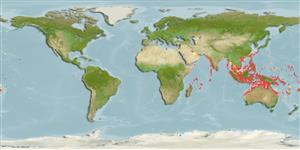>
Ovalentaria/misc (Various families in series Ovalentaria) >
Pomacentridae (Damselfishes) > Pomacentrinae
Etymology: Amphiprion: Greek, amphi = on both sides + Greek, prion, -onos = saw (Ref. 45335).
Eponymy: John Clark was an engraver who engraved plates for JW Bennett and aquatinted the results to produce superb illustrations. [...] (Ref. 128868), visit book page.
Environment: milieu / climate zone / depth range / distribution range
экология
морской ассоциированный с рифами; немигрирующий; пределы глубины 1 - 70 m (Ref. 58652). Tropical; 30°N - 30°S, 47°E - 172°W
Indo-West Pacific: Persian Gulf to Western Australia, throughout the Indo-Australian Archipelago and in the western Pacific at the islands of Melanesia and Micronesia, north to Taiwan, southern Japan and the Ryukyu Islands.
Size / Вес / Возраст
Maturity: Lm ? range ? - ? cm
Max length : 15.0 cm SL самец/пол неопределен; (Ref. 6113); наибольший возраст (опубликованны данные): 11 годы (Ref. 11318)
Краткое описание
определительные ключи | морфология | морфометрия
колючие лучи спинного плавника (общее число) : 10; членистые (мягкие) лучи спинного плавника (общее число) : 15 - 16; колючие лучи анального плавника: 2; членистые (мягкие) лучи анального плавника: 13 - 14.
Adults inhabit lagoons and outer reef slopes. Omnivorous. Oviparous, with elliptical eggs (Ref. 240). Monogamous (Ref. 52884). Oviparous, distinct pairing during breeding (Ref. 205). Eggs are demersal and adhere to the substrate (Ref. 205). Males guard and aerate the eggs (Ref. 205). Associated with the anemones: Cryptodendrum adhaesivum, Entacmaea quadricolor, Heteractis aurora, Heteractis crispa, Heteractis magnifica, Heteractis malu, Macrodactyla doreensis, Stichodactyla gigantea, Stichodactyla haddoni, and Stichodactyla mertensii(Ref. 5911). Has been observed to share home anemone with individuals of A. sandaracinos (Ref. 90000). Has been reared in captivity (Ref. 35418, 35420). Maximum depth reported taken from Ref. 128797.
Life cycle and mating behavior
половая зрелость | размножение | нерест | икра | Fecundity | личинки
Benthic spawner. Sex reversal is completed in less than 5-6 months (Ref. 34185). Oviparous, distinct pairing during breeding (Ref. 205). Monogamous mating is observed as both obligate and social (Ref. 52884). Eggs are demersal and adhere to the substrate (Ref. 205). Males guard and aerate the eggs (Ref. 205).
Allen, G.R., 1991. Damselfishes of the world. Mergus Publishers, Melle, Germany. 271 p. (Ref. 7247)
Статус Красного Списка МСОП (Ref. 130435: Version 2024-1)
Угроза для людей
Harmless
Использование человеком
рыболовство: рыболовство как средство для существования; аквариум: коммерческий
дополнительная информация
инструменты
Специальные отчеты
Скачать в формате XML
ресурсы в Интернет
Estimates based on models
Preferred temperature (Ref.
123201): 25.3 - 29, mean 27.9 °C (based on 742 cells).
Phylogenetic diversity index (Ref.
82804): PD
50 = 0.5000 [Uniqueness, from 0.5 = low to 2.0 = high].
Bayesian length-weight: a=0.02344 (0.01134 - 0.04848), b=2.98 (2.80 - 3.16), in cm total length, based on LWR estimates for this (Sub)family-body shape (Ref.
93245).
Trophic level (Ref.
69278): 2.9 ±0.1 se; based on diet studies.
Generation time: 2.7 ( na - na) years. Estimated as median ln(3)/K based on 1
growth studies.
устойчивость к внешним воздействиям (Ref.
120179): средний (среднего размера), минимальное время удвоения популяции 1.4-4.4 года (Fec = 1,000).
Fishing Vulnerability (Ref.
59153): Low to moderate vulnerability (29 of 100).
Nutrients (Ref.
124155): Calcium = 81.5 [41.5, 125.4] mg/100g; Iron = 0.659 [0.409, 1.063] mg/100g; Protein = 18.2 [17.1, 19.4] %; Omega3 = 0.118 [0.074, 0.185] g/100g; Selenium = 28.5 [16.5, 51.2] μg/100g; VitaminA = 85.3 [24.3, 288.6] μg/100g; Zinc = 1.51 [1.06, 2.15] mg/100g (wet weight);
